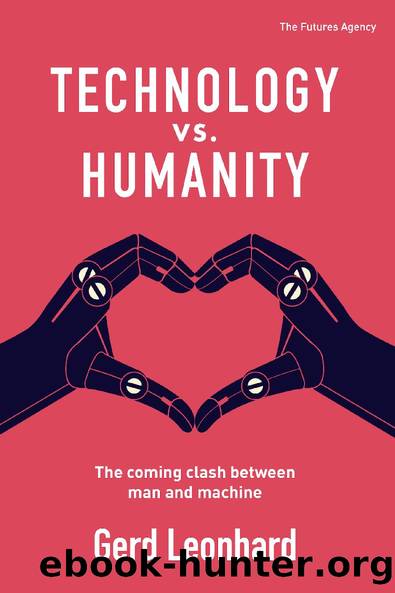Technology vs. Humanity: The Coming Clash Between Man and Machine by Gerd Leonhard

Author:Gerd Leonhard [Leonhard, Gerd]
Language: eng
Format: epub
ISBN: 9781096496724
Google: ctdlxQEACAAJ
Publisher: Amazon
Published: 2016-09-06T00:06:45.396524+00:00
Chapter 7 Digital Obesity: Our Latest Pandemic
As we wallow and pig out on a glut of news, updates, and algorithmically engineered information that may be anything but, we entertain ourselves in a burgeoning tech-bubble of questionable entertainment.
Obesity is a global issue, and, according to McKinsey, itâs costing an estimated US$450 billion per year in the US alone, both in terms of healthcare costs and lost productivity.130 The Centers for Disease Control and Prevention stated in 2015 that more than two-thirds of Americans are overweight, and an estimated 35.7% are obese.131
I believe we are reaching a similar or bigger challenge as we gorge on technology and bring on digital obesity.
I define digital obesity as a mental and technological condition in which data, information, media, and general digital connectedness are being accumulated to such an extent that they are certain to have a negative effect on health, well-being, happiness, and life in general.
Perhaps unsurprisingly, and despite those shocking health factoids, there is still little support globally for stricter regulation of the food industry to curb the use of addiction-building chemical additives, or to stop marketing campaigns that promote overconsumption. In Americaâs never-ending war on drugs, harmful foodstuffs and sugars are never so much as hinted at. Just as organic foods now seem to be largely the preserve of the well-off and wealthy, so too can we expect anonymity and privacy to become expensive luxuriesâout of reach for most citizens.
Consumers are buying gadgets and apps that will supposedly help them reduce food consumption and increase fitness, such as the Fitbit, Jawbone, Loseit, and now Hapiforkâwhich alerts you by trembling if you eat too fastâvery useful indeed.132 It appears the idea is to buy (download) and consume yet another product or service that will miraculously, and without much effort, fix the original problem of overconsumption.
Cravability means prosperity
The obvious bottom line is that the more people eat, the better it is for those who produce and sell our foodâfor example, growers, food processors, grocery stores, supermarkets, fast-food joints, restaurants, bars, and hotels. In addition, we may be shocked to find that, every year, every consumer in developed countries unwittingly ingests an estimated 150 pounds of additivesâmostly sugar, yeast, and antioxidants, as well as truly nasty stuff such as MSG.133 These substances are the lubricants of overconsumption. Not only do they make food prettier and more durable, they also make it taste betterâ as debatable as that is. Thus consumers are strung along by cleverly engineering a âneed-for-moreâ so that it becomes very hard to find the exit from that kingdom of endless, happy consumption.
If this sounds like Facebook or your smartphone, you are getting my drift. The food industry actually calls this cravability or craveability.134In the world of technology, marketers call it magic, stickiness, indispensability, or more benignly, user engagement.
Craving and addictionâtechâs business model
Generating this kind of craving, or fueling our digital addictions in such a seemingly benign way, is clearly a powerful business model.135 It is easy to apply the cravability concept to the
Download
This site does not store any files on its server. We only index and link to content provided by other sites. Please contact the content providers to delete copyright contents if any and email us, we'll remove relevant links or contents immediately.
Kathy Andrews Collection by Kathy Andrews(11276)
The remains of the day by Kazuo Ishiguro(8338)
Paper Towns by Green John(4753)
Spare by Prince Harry The Duke of Sussex(4747)
The Body: A Guide for Occupants by Bill Bryson(4538)
Industrial Automation from Scratch: A hands-on guide to using sensors, actuators, PLCs, HMIs, and SCADA to automate industrial processes by Olushola Akande(4428)
Be in a Treehouse by Pete Nelson(3621)
Harry Potter and the Goblet Of Fire by J.K. Rowling(3579)
Never by Ken Follett(3489)
Machine Learning at Scale with H2O by Gregory Keys | David Whiting(3436)
Goodbye Paradise(3413)
The Remains of the Day by Kazuo Ishiguro(3100)
Into Thin Air by Jon Krakauer(3099)
The Cellar by Natasha Preston(3058)
The Genius of Japanese Carpentry by Azby Brown(3010)
Drawing Shortcuts: Developing Quick Drawing Skills Using Today's Technology by Leggitt Jim(2910)
120 Days of Sodom by Marquis de Sade(2906)
Fairy Tale by Stephen King(2855)
The Man Who Died Twice by Richard Osman(2777)
